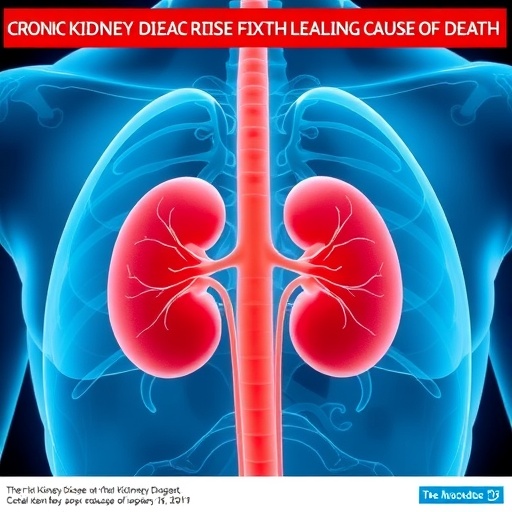The global burden of chronic kidney disease (CKD) has reached unprecedented levels, with nearly 788 million people worldwide now estimated to have diminished kidney function in 2023, marking more than a twofold increase since 1990. This surge is largely attributed to demographic shifts, including population growth and aging, which have propelled CKD into the top ten causes of death worldwide for the first time. The disease’s insidious rise underscores an urgent public health challenge that demands concerted global attention and intervention.
CKD is characterized by the gradual decline in the kidneys’ ability to effectively filter waste products and excess fluids from the bloodstream. This impairment often progresses silently, with mild cases remaining asymptomatic for extended periods. However, as kidney function deteriorates, patients may experience increasingly severe symptoms that necessitate complex medical interventions such as dialysis, kidney replacement therapy, or transplantation. The ubiquity and stealthy nature of the disease complicate early diagnosis and management, factors crucial for mitigating its progression and downstream complications.
An extensive collaborative research endeavor, spearheaded by scientists from NYU Langone Health, the University of Glasgow, and the Institute for Health Metrics and Evaluation at the University of Washington, provides the most comprehensive assessment of CKD’s global impact in nearly a decade. This systematic analysis, embedded within the Global Burden of Disease 2023 study, synthesizes data from over two thousand scientific publications and health datasets across 133 countries, enabling a granular examination of disease prevalence, mortality, and associated disability.
The study reveals that approximately 14% of the adult global population is afflicted with CKD, translating into a staggering health burden that has escalated since the 1990s. Alarmingly, CKD was responsible for roughly 1.5 million deaths in 2023 alone, reflecting a more than 6% increase in age-standardized mortality rates when contextualized over three decades. These figures illuminate CKD not merely as a chronic condition but as a lethal threat with widespread implications for global health systems.
Moreover, the impact of CKD extends beyond renal impairment. The disease was identified as a pivotal risk factor for cardiovascular morbidity and mortality, contributing to about 12% of deaths from heart disease worldwide. This intersection with cardiovascular pathology amplifies the disease’s clinical complexity, as CKD patients frequently grapple with compounded health challenges that exacerbate mortality risk and diminish quality of life.
Despite the overwhelming disease burden, the vast majority of individuals with CKD are diagnosed in early stages where interventions can be highly effective. Treatment strategies integrating pharmacological therapies and lifestyle modifications have shown promise in halting or at least slowing disease progression, thereby potentially averting the need for costly and resource-intensive procedures like dialysis or transplant. Early detection, therefore, emerges as a critical priority in clinical practice.
This imperative for early diagnosis collides with stark disparities in global healthcare accessibility, particularly in low-income regions such as sub-Saharan Africa, Southeast Asia, and parts of Latin America. In these settings, access to life-saving treatments like dialysis and transplantation is severely limited by resource constraints, resulting in disproportionately high mortality rates. The inequitable distribution of medical services serves as a formidable barrier to effective CKD management and highlights the necessity for scalable, affordable healthcare solutions.
International health authorities have recognized CKD as a growing concern; in May 2025, the World Health Organization incorporated CKD into its agenda aimed at reducing premature mortality from noncommunicable diseases by one-third by 2030. Realizing this target requires a comprehensive understanding of epidemiological trends alongside robust healthcare policies designed to expand diagnostic coverage and facilitate equitable access to emerging treatments.
Contemporary advances in nephrology illuminate new therapeutic avenues. In recent years, novel drugs have been introduced that not only decelerate renal decline but also reduce cardiovascular risk, including the incidence of heart attacks, strokes, and heart failure. While these innovations herald a new era in CKD management, widespread implementation remains nascent, and measurable global improvements are anticipated to unfold over an extended timeline.
The underdiagnosis of CKD looms as a significant obstacle to addressing the epidemic effectively. Many individuals with impaired kidney function remain undetected due to insufficient urine testing and limited awareness. Consequently, the true prevalence of CKD might be substantially underestimated, masking the full extent of the crisis and delaying timely intervention for countless patients.
The Global Burden of Disease 2023 study provides a vital epidemiological snapshot that can inform resource allocation, clinical guidelines, and policy frameworks. Its integrative approach, combining clinical data with demographic and regional analyses, equips stakeholders with actionable intelligence to confront CKD’s escalating impact comprehensively.
Publication of these findings in the esteemed journal The Lancet, coupled with their simultaneous presentation at the American Society of Nephrology’s annual Kidney Week conference, underscores the research community’s commitment to elevating CKD as a central focus of medical inquiry and public health strategy.
Funding for this critical research was facilitated by prominent institutions including the National Institutes of Health, the Bill and Melinda Gates Foundation, and the National Kidney Foundation, further highlighting the collaborative global effort to combat what has been termed the “silent killer” lurking beneath the surface of global health statistics.
As CKD continues to exact a toll globally, the convergence of epidemiological insights, therapeutic advancements, and policy prioritization offers a glimmer of hope. However, this will only translate into meaningful impact through sustained investment, innovative healthcare delivery models, and heightened public and clinical vigilance that together can curb the tide of this pervasive and deadly disease.
Subject of Research: People
Article Title: Global, regional, and national burden of chronic kidney disease in adults, 1990–2023, and its attributable risk factors: a systematic analysis for the Global Burden of Disease Study 2023
News Publication Date: 7-Nov-2025
Web References: DOI: 10.1016/S0140-6736(25)01853-7
Keywords: Nephropathies, Hemodialysis, Organ transplantation, Mortality rates, Heart disease, Obesity, Health disparity




